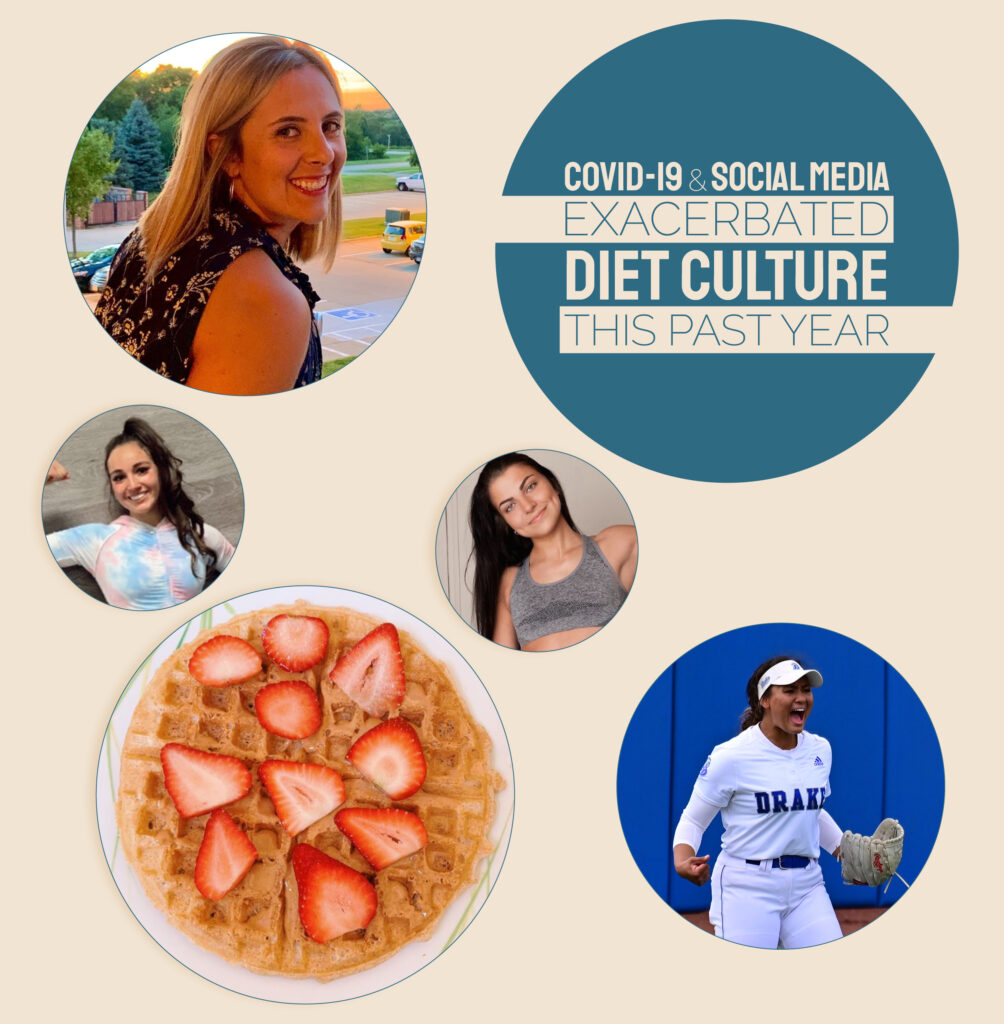
Imagine living in a world where diet culture, quick fixes, and a constant need for exercise didn’t consume your daily life. Would your mental state improve? The women featured in this article have struggled with weight and their relationship with food in different ways; something the pandemic only exacerbated.
According to The International Journal of Eating Disorders, the COVID‐19 pandemic has created a global context likely to increase eating disorder (ED) risks and symptoms, decrease factors that protect against EDs, and increase barriers to care.
The disruptions to daily routines, closure of gyms, and limitations to outdoor activities can increase weight and body concerns. These can impact disordered eating habits, exercise, and sleep, which may in turn increase ED risk and symptoms.
Drake University junior, Alexia Lara, experienced the impact of diet culture after being sent back home in March 2020. She was without sports, the gym, and her daily routine; leaving her at home with other things to think about. One being food.
“It did consume a lot of my thoughts during the pandemic,” Lara says. “All I had was school, I wasn’t doing softball, so I would just scroll through Instagram feeds and see food and different workouts all the time.”
Lara personally saw the increase of content contributing directly toward diet culture when everything shut down in March 2020, as it led to most of her thoughts during quarantine regarding food.
“I think a lot of people were posting more during the pandemic, ‘here’s how to stay fit during quarantine’,” Lara says. “It wasn’t like OK, let’s just take a break. Everyone was ‘go go go,’ and focusing on fitness during this time.”
Social media platforms, primarily TikTok, contributed to diet culture, as ‘Quarantine 20’ along with ‘quarantine glow up’ was trending amid the pandemic.
“Either people were talking about gaining weight during quarantine, or talking about getting really fit during quarantine,” Lara says.
Intuitive Eating
Diet culture has been consumed by popular diets such as keto, intermittent fasting, paleo, and a low-carb diet. These diets can have serious consequences such as restricting people from eating certain foods or nutrients the body needs.
Intuitive eating does the opposite. This style of eating makes you an expert on your personal hunger signals. Listening to your body is the number one pillar of intuitive eating; this approach also encourages people to focus on positive body image.
Des Moines nutritionist, Mackenzie Woolwich teaches her clients to unlearn what diet culture has conditioned them to do by becoming an intuitive eater. Woolwich acknowledges that during a pandemic, this style of eating isn’t the most popular option for people.
“If all you did was gain 15 pounds over this last year while we were in a pandemic, then I’d say you’re doing pretty well,” Woolwich says. “Unfortunately, diet culture has to creep in there and get its dirty little hands all over everything, and all of a sudden make us feel bad.”
People faced food insecurity during the pandemic which halted many from checking off health goals. Woolwich has come across a variety of people in her work who struggle with their relationship with food. She has found that intuitive eating is the best practice to start a health journey.
The philosophy of intuitive eating consists of 10 principles, including rejecting diet mentality, honoring your hunger, making peace with food, and respecting your body.
Implementing these principles into your daily life will serve people better than diets that promote food restrictions and unhealthy food patterns. Rachel (@Healthywaysfordays) on Instagram showcases how she eats what she wants when she wants it.
Healthywaysfordays
Rachel, an online blogger who only uses her first name for privacy reasons, originally began her Instagram account as a way to cope with her relationship to food. Little did she know, she would end up with 105K followers. She has practiced intuitive eating for several years now, and encourages her followers to do the same.
Rachel created her account in 2014, and since has created a community to show people healthy eating is easy and fun. However, she says during the pandemic it has been increasingly more difficult for people to realize that.
“Within the past year with quarantine, there has definitely been an increase with people who do have a bad relationship with food because now instead of seeing a photo, you’re seeing someone supporting a negative relationship with food,” Rachel says.
The drastic increase of content related to diet culture on all social media platforms led to over consumption throughout the pandemic, impacting individuals’ relationship with food.
“People will do anything to drop however much weight they can, however fast they can and that’s what diet culture is,” Rachel says. “It’s so sad, people will start going on a diet when they’re 14 and never get off a diet their entire lives, because they are always trying the next new fad, the next new diet.”
She also mentions how the content affects those who continually obtain it, and how it contributes to disordered eating habits for individuals.
“People will look at somebody who posts a picture of them and a salad, and they’re going to think that they’ll look like that person if they eat a salad,” Rachel says. “Even if we all ate the same, our bodies would look so different.”
She emphasizes the importance of finding what works for each person in order to maintain a healthy lifestyle, as it looks different for everyone.
“You will never find one thing that everyone can agree on, so it’s better to just do what works for your body, what you want to do, and what’s sustainable for your lifestyle,” Rachel says.
It’s just a matter of time before the next new diet trend goes viral. There is always something new to persuade people to try to drop a few pounds for the summer. However, there are many resources available for people in order to help them determine what will work best for them, including social media accounts that promote a healthy lifestyle and relationship with food—including registered dietitian (RD), Mackenzie Woolwhich and @Healthywaysfordays Instagram page.
“Ultimately you are in charge of the content you consume, and these people have no education on what’s healthy and what’s not healthy. But, when you put it on the internet and it starts to go viral, it’s something that not everyone should be doing, so you need to be doing some research,” Rachel says.
Fitness
Working out isn’t working out, and that’s OK. There isn’t a rule book on how many days or hours a week someone needs to put in to meet fitness goals. Everyone’s health journey is different, and everything on social media isn’t what it seems.
Fitness gurus Stephanie Flores (@sfloresfitness_) and Amanda Gantt (@amanda.gantt) explain their challenges with their preferred exercise form, weight lifting.
Gantt has been lifting for about six years and recalled her biggest setback was when she underwent surgery for a spinal fusion.
“For six months I couldn’t jog or lift more than 10 pounds,” Gantt says. “I was just surviving.”
This experience put things into perspective and it motivated Gantt to come back and hit new fitness goals. Flores has had her challenges since starting her fitness journey seven months ago.
“For me, my biggest struggle—and I was warned that this would happen—is body dysformania,” Flores says. “It’s intense and it comes in waves.”
Body dysmorphic disorder is a mental illness that causes anxious thoughts about one’s physical appearance and it impacts about 1 in 50 people according to the Cleveland Clinic.
Many people feel amazing one day and horrible the next about their bodies. Thousands are suffering from the same mental illness.
Even though both Gantt and Flores have had their challenges, they have each other to lean on.
“I feel more confident when we work out together, we try new things and it’s not embarrassing,” Gantt says. Flores shared that Gantt makes her feel safer at the gym and has also provided workouts for her to try out.
For More Information
Mackenzie Woolwhich offers nutrition advice on a wide range of mediums to spread one important message: “I didn’t let myself go, I let myself live.”
@Healthywaysfordays uses her Instagram to share with others her fun and happy meals in hopes to inspire others to build their own colorful plate of food.
Lastly, Stephanie Flores (@sfloresfitness_) and Amanda Gantt (@amanda.gantt) utilize their Instagram accounts to document their own health journeys.
